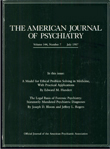Psychosis After Ultrarapid Opiate Detoxification
To the Editor: Ultrarapid opiate detoxification is a procedure that uses high doses of opiate antagonists to precipitate rapid opiate withdrawal (1). Although problems have arisen with ultrarapid opiate detoxification, the University of Illinois at Chicago protocol (2) has resulted in few complications. We report a case of ultrarapid opiate detoxification complicated by psychosis that abated within 24 hours.
Ms. A was a 45-year-old woman who was taking 100 mg/day of methadone and 4 mg/day of alprazolam concurrently. She desired detoxification because of a 40-lb weight gain that she attributed to methadone therapy, but she did not wish to undergo conventional detoxification. Ms. A was advised to stop taking alprazolam before ultrarapid opiate detoxification, but she refused and mentioned that she had attempted suicide after a past detoxification.
Twelve days before the ultrarapid opiate detoxification, a toxicology screen was positive for methadone and benzodiazepines but negative for all other drugs of abuse. Ms. A discontinued methadone treatment, and hydrocodone therapy was initiated. One day before the ultrarapid opiate detoxification, a toxicology screen was positive for methadone. Ultrarapid opiate detoxification was conducted according to protocol (2) and included benzodiazepine substitution. During extubation and over the next few hours, Ms. A was intermittently agitated despite being fully oriented. Several hours after ultrarapid opiate detoxification, Ms. A was observed ingesting pills not supplied by staff. When staff confronted her, she admitted ingesting alprazolam for anxiety.
Subsequently, Ms. A reported feeling as if the previous few hours had been a bad dream or “bad trip.” She reported believing staff were trying to kill her and that during extubation the anesthesiologist was attempting to choke her. She also reported auditory but neither visual nor tactile hallucinations. These symptoms completely disappeared in 24 hours. At her 3-month follow-up, Ms. A was still in treatment for addiction, but toxicology screens were negative for methadone and other opiates.
To our knowledge, this is the first report of psychosis in a patient undergoing ultrarapid opiate detoxification. Many of the medications involved (methadone, alprazolam, naloxone, clonidine, propofol, and midazolam) have been associated with the occurrence of delirium, psychosis, or hallucinosis. However, psychosis in the absence of disorientation has not been encountered in the more than 125 patients who have undergone ultrarapid opiate detoxification at our facility.
Psychosis in the presence of a clear sensorium is unusual in alprazolam withdrawal. Although methadone’s long half-life could account for its detection 12 days after discontinuation, surreptitious use must be considered. Ms. A’s methadone/alprazolam combined doses, which have not been encountered among our patients undergoing ultrarapid opiate detoxification, may be responsible for the unusual reaction that she experienced. This combination is reported to be common in methadone clinics and has been implicated in some fatalities (3). Although no definitive conclusions can be drawn from this case report, extreme caution is advisable when treating methadone-maintained patients who use alprazolam and are undergoing ultrarapid opiate detoxification.
1. O’Connor PG, Kosten TR: Rapid and ultrarapid opioid detoxification techniques. JAMA 1998; 279:229–234Crossref, Medline, Google Scholar
2. McDonald T, Hoffman WE, Berkowitz R, Cunningham F, Cooke B: Heart rate variability and plasma catecholamines in patients during opioid detoxification. J Neurosurg Anesthesiol 1999; 11:195–199Crossref, Medline, Google Scholar
3. Rogers WO, Hall MA, Brissie RM, Robinson CA: Detection of alprazolam in three cases of methadone/benzodiazepine overdose. J Forensic Sci 1997; 42:155–156Medline, Google Scholar



